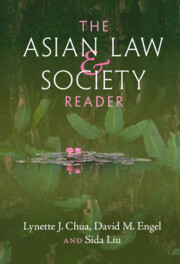Book contents
- Reviews
- The Asian Law and Society Reader
- The Asian Law and Society Reader
- Copyright page
- Dedication
- Contents
- Detailed Table of Contents
- Acknowledgments
- Publisher’s Acknowledgments
- Introduction
- 1 Religion
- 2 Legal Pluralism
- 3 Disputing
- 4 Legal Consciousness
- 5 Legal Mobilization
- 6 Legal Professions
- 7 Courts
- 8 Crime and Justice
- 9 Practicing Law and Society Scholarship in Asia
- Index
- References
3 - Disputing
Published online by Cambridge University Press: 02 March 2023
- Reviews
- The Asian Law and Society Reader
- The Asian Law and Society Reader
- Copyright page
- Dedication
- Contents
- Detailed Table of Contents
- Acknowledgments
- Publisher’s Acknowledgments
- Introduction
- 1 Religion
- 2 Legal Pluralism
- 3 Disputing
- 4 Legal Consciousness
- 5 Legal Mobilization
- 6 Legal Professions
- 7 Courts
- 8 Crime and Justice
- 9 Practicing Law and Society Scholarship in Asia
- Index
- References
Summary
The study of disputing has been a central concern of law and society scholars for nearly fifty years. Rather than focusing narrowly on cases litigated in state courts, law and society scholars broadened their perspective to include the handling of conflict in myriad fora throughout society, from neighborhood councils to consumer complaint boards to the interventions of shamans and village leaders. Law and society researchers working in Asian settings are no exception. Some earlier studies were village-based, highlighting the largely conciliatory practices of mediators who sought to maintain harmony by promoting apology, restitution, and spiritual well-being. Recent studies examine the relationship between litigation and nonjudicial dispute resolution, highlighting the ways in which courts and judges are influenced by the handling of conflict outside state law. A third type involves state’s attempts to divert litigated cases to “alternative dispute resolution” procedures established as adjuncts to the formal system. Although ADR is sometimes promoted as a restoration of traditional community mediation, law and society researchers have generally demonstrated that its close connection to the official legal system raises complex issues of justice and the protection of rights by persons who lack sufficient wealth or power to succeed within formal judicial arenas.
- Type
- Chapter
- Information
- The Asian Law and Society Reader , pp. 114 - 138Publisher: Cambridge University PressPrint publication year: 2023

